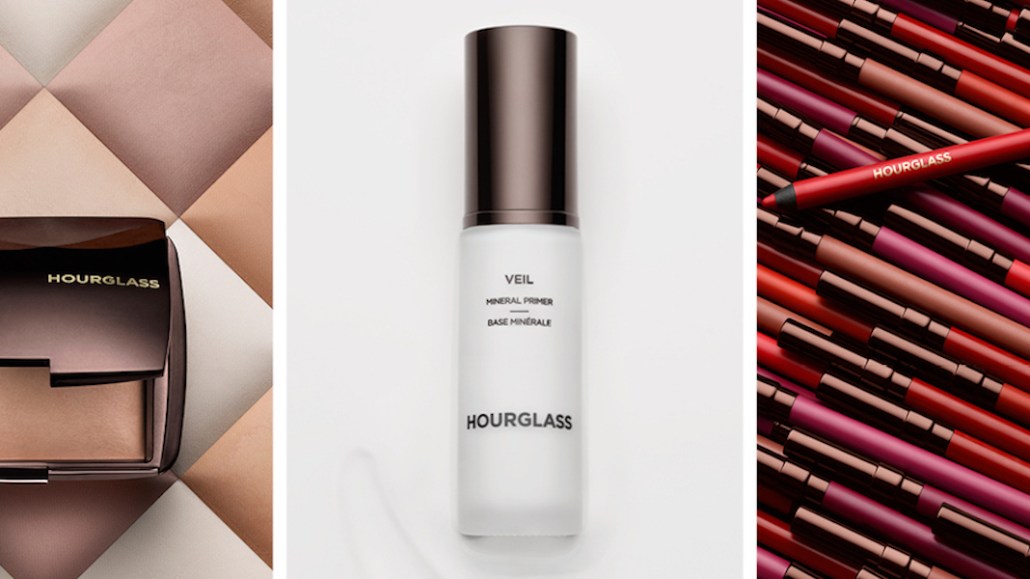Secure your place at the Digiday Publishing Summit in Vail, March 23-25

Hourglass Cosmetics is going fully vegan, announcing today that it will clean up its products’ ingredients by 2020.
Already selling predominantly vegan products that it doesn’t test on animals, the brand the brand will eliminate from its products the industry’s frequently used animal-derived ingredients, including beeswax, lanolin (a wax derived from sheepskin) and carmine (a dye made from beetles’ wings). CEO Carisa Janes said the brand is asking experts in the bio-tech space to find new ingredients that don’t sacrifice quality.
The company’s current vegan products include its cult-loved (and Angelina Jolie-approved) Veil Mineral Primer and Ambient Lighting Palette. Products range from $18 to $350, and the price range will not change as the brand evolves into one that’s fully vegan, said Janes.
“Luxury is a combination of innovation and integrity, and our values have always been exemplified in our commitment to creating cruelty-free products,” she said of the transition. “If we are truly committed to being 100 percent cruelty-free, we shouldn’t have animal-derived ingredients in our products.”
The decision takes a page from younger, middle-market brands like It Cosmetics, Nailberry and Cover FX, beauty lines that launched free of animal byproducts. Kat Von D also committed last year to make her makeup brand all-vegan in the years to come.
As a luxury competitor, Hourglass is angling to get ahead of a movement that’s slated to grow even more in the coming years, thanks to consumers’ heightened interest in animal welfare and plant-derived products, according to a recent report by Market Research Future. The report expects “cruelty-free” products alone to grow about 6.1 percent by 2023, a stamp which competitors in the space — including YSL Beauty and SK-II, owned by L’Oréal and Procter & Gamble, respectively — have yet to attain. Google’s latest report on skin-care trends found that searches for vegan products have grown 83 percent year over year since 2010 in the U.S., the market driving the trend.
“Consumers today care more than ever about animal cruelty,” said Tara Foley, a clean beauty expert and the founder of the Follain natural beauty chain, adding that the animal rights group PETA is about 6 million members strong and growing. That, coupled with health concerns surrounding animal products, have led to the vegan diet and lifestyle increasing in popularity, with plant-based food sales growing by 8.1 percent in the last year.
Unilever, which bought Hourglass this June for $250 million to $300 million, is banking on this phenomenon. During its third quarter earnings call in October, the company’s CFO Graeme Pitkethly said its slew of recent beauty acquisitions (including the skin-care line Dermalogica and the hair styling brand Living Proof) will help extend its personal care presence “into much higher growth points.” The largest opportunity, he said, would be with brands with a purpose that’s clearly articulated and connects with consumer values.
Hourglass will sell a limited-edition vegan leather makeup bag online and in its flagship Venice store, contributing all of the profits to animal rights. Its products (vegan and otherwise) are sold across over 500 wholesale accounts, including Barneys New York and Bergdorf Goodman.
“The majority of our products are already vegan,”Janes said, “so this will be a natural evolution.”
More in Marketing

Why Edward Jones’ agentic AI trial comes with limits
Edward Jones tests agentic AI to drive marketing productivity, taking a measured approach as it stops short of full automation.

Footwear brands navigate uncertainty after latest tariffs flip-flop
Some 99% of footwear sold in the U.S. today is imported, according to the Footwear Distributors and Retailers of America.

Brands at eTail Palm Springs share lessons on the ‘messy middle’ of building AI tools
Here’s a rundown of lessons brands have shared about their AI implementations so far.









